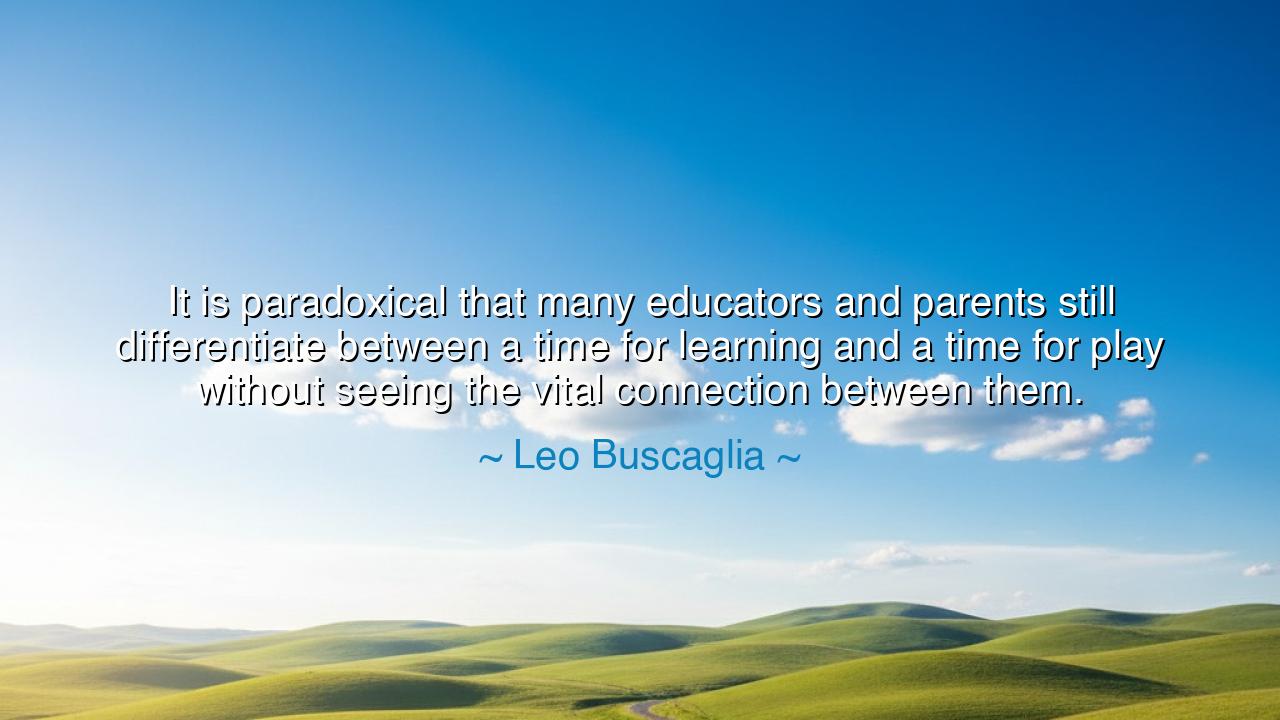
It is paradoxical that many educators and parents still
It is paradoxical that many educators and parents still differentiate between a time for learning and a time for play without seeing the vital connection between them.






“It is paradoxical that many educators and parents still differentiate between a time for learning and a time for play without seeing the vital connection between them.” — Thus spoke Leo Buscaglia, the great teacher of love and life, whose words continue to echo in the hearts of those who believe that joy and wisdom are not separate paths but one and the same. His insight strikes at the very heart of human growth: that play is not the enemy of learning, but its truest companion. To divide them, as many still do, is to misunderstand the nature of the human spirit — for the mind learns best when the heart is alive with curiosity, freedom, and delight.
In these words, Buscaglia calls out the paradox that lies at the center of modern education and parenting. Many believe that discipline and seriousness alone can forge intelligence, while play is seen as a distraction, a luxury, or even a waste of time. But this is an illusion — one that dims the natural light of discovery. For learning is not merely the memorization of facts or the mastery of formulas; it is the awakening of the soul to the wonders of existence. And the spirit awakens not through fear or obligation, but through joy — through laughter, imagination, and the playful dance of the mind exploring what it loves.
In truth, play and learning are one. When a child builds with blocks, she is not merely amusing herself; she is learning the laws of balance, structure, and creation. When she invents a game, she practices problem-solving, social understanding, and creativity. In the ancient academies of Greece, Plato himself taught that “you can discover more about a person in an hour of play than in a year of conversation.” The ancients knew what we have forgotten — that to learn through play is to align with the natural rhythm of the human soul. The heart that plays is open, and the open heart receives knowledge like fertile soil receives the rain.
Buscaglia, who spent his life teaching about the power of love and human connection, understood this truth deeply. He believed that learning is not confined to classrooms, and that education without joy becomes sterile. His own teaching style — exuberant, passionate, and filled with laughter — was an embodiment of his philosophy. He often reminded his students that love, creativity, and curiosity cannot thrive in an environment ruled by fear or rigidity. When learning becomes a burden, the flame of curiosity flickers and dies. But when learning is playful — when it engages both the mind and the heart — that flame grows into a lifelong fire.
Consider the story of Maria Montessori, the pioneer of child-centered education. In an age when schools were strict, silent, and joyless, she dared to introduce playful learning. She filled her classrooms with hands-on materials and encouraged children to explore freely, to learn through touch, sound, and movement. The results astonished the world. Her students were not only more capable but also more confident, kind, and self-motivated. Montessori, like Buscaglia, understood that play is the language of learning, that discovery and delight are not opposites but allies. Through play, the child learns not because they must — but because they love to.
And yet, the paradox persists. Too many still separate work and play, study and joy, as though the two cannot coexist. Adults often forget that they too were once children — that their greatest moments of learning came not from lectures, but from wonder. A bird in flight, a story told, a game invented — these were the first teachers. To banish play from learning is to cut the roots of curiosity, to silence the natural music of growth. The wise understand that the best teacher does not merely instruct; they inspire, and inspiration is born from playfulness, not pressure.
So, my child, remember this truth: never stop playing, for play is the breath of learning. Approach your work with the same curiosity that filled your youth. Laugh as you study. Experiment without fear. When you teach others, let joy guide your voice, for knowledge shared in love takes deeper root. Parents, let your children learn through movement and imagination; teachers, let your students explore and create. Do not fear play — embrace it, for it is the purest form of wisdom at work.
For in the end, as Leo Buscaglia reminds us, life itself is the greatest classroom, and every moment offers a chance to learn. The wise do not wait for separate times to study and to live — they see learning in the laughter of the day, in the games of the heart, in the creative wonder of being alive. The soul that plays, learns. The soul that learns, grows. And the soul that both learns and plays — that soul becomes radiant, ever young, and ever wise.






AAdministratorAdministrator
Welcome, honored guests. Please leave a comment, we will respond soon